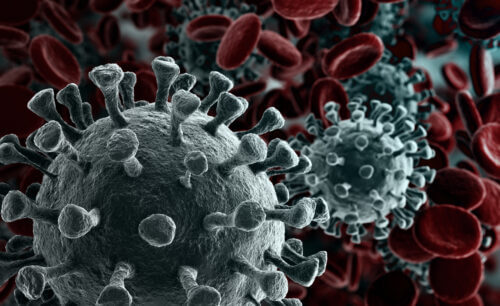However, the researchers are testing each molecule for fear that it may bind to different tissues in the body and attack them instead of the virus

Researchers at the German Center for Degenerative Diseases (DZNE) and Charité – Universitätsmedizin in Berlin have identified highly effective antibodies against The SARS-CoV-2 corona virus And now they are In the race for the development of a passive vaccine. In the process, they also discovered that some SARS-CoV-2 antibodies bind to tissue samples from different organs, which can trigger unwanted side effects. They report their findings in the scientific journal "Cell".
Initially, the scientists isolated almost 600 different antibodies from the blood of people who had overcome COVID-19, the disease caused by SARS-CoV-2. Through laboratory testing, they were able to narrow that number down to a few antibodies that were particularly effective in resisting the virus. Then, they produced these antibodies artificially using cell cultures. The neutralizing antibodies identified bind to the virus, as crystal analysis reveals, thereby preventing the pathogen from entering cells and multiplying. In addition, recognition of viruses by antibodies helps the cells of the immune system to eliminate the pathogen. Studies in hamsters - which, like humans, are susceptible to infection by SARS-CoV-2 - confirmed the high efficiency of the selected antibodies: "If the antibodies were given after infection, the hamsters developed mild disease symptoms at most. If the antibodies were applied prophylactically - before the infection - the animals did not get sick," said Dr. Jacob Kray, coordinator of the current research project and researcher at DZNE, he is one of the two first authors of the current publication.
Antibodies for passive immunization
The treatment of infectious diseases using antibodies has a long history. For COVID-19, this approach is also being explored using plasma taken from the blood of recovered patients. Donor antibodies are transferred with the plasma. "Ideally, the most effective antibody is produced in a controlled manner on an industrial scale and of constant quality. This is the goal we strive for," said Dr. Munson Reinke, who is also the first author of the current article.
"Three of our antibodies seem particularly suitable for clinical development," explained Prof. Dr. Harald Prous, leader of the research group at NEDZ and also a senior physician at the experimental neurology clinic at Charité - Universitätsmedizin Berlin. "Using these antibodies, we have begun to develop a passive vaccine against SARS-CoV-2." Such a project requires cooperation with industrial partners. This is why the scientists are collaborating with Miltenyi Biotec.”
In addition to treating the sick, protection of healthy people who have been in contact with infected people is also a potential application. How long the protection will last - this issue will need to be investigated in clinical studies. According to Prof. Peros, "The reason for this is that, unlike an active vaccine, a passive vaccine involves the administration of active antibodies, which degenerate after a while. In general, the protection provided by passive vaccination is less durable than that provided by active vaccination. However, the effect of a passive vaccine is almost immediate, while an active vaccine needs time to develop. "It is better that both options be available so that there is a flexible response depending on the situation."
modern technologies
Kreia, Reinke, Prous and their colleagues typically deal with autoimmune diseases of the brain, in which antibodies mistakenly attack neurons. "In view of the COVID-19 epidemic, it was clear that our resources should also be used for other purposes," said Prof. Prous. For the current project, the researchers benefit from a project funded by the Helmholtz Association: "BaoBab Innovation Lab". In this framework, they develop and refine technologies for the characterization and production of antibodies, which they are currently implementing. "Now, we are working with our industrial partner to determine the conditions that will enable the most efficient large-scale production of the antibodies we have identified," Prous said. "The next step is clinical trials - tests on humans. However, this cannot be expected before the end of the year at the earliest. The planning for this has already started."
Possible side effects
During the investigations, the researchers made another discovery: some of the antibodies that are particularly effective against the corona virus are especially attached to proteins in the brain, heart muscle and blood vessels. In tests with tissue samples from mice, several of the neutralizing antibodies exhibited such cross-reactivity. Thus, they were not included in the development of the passive vaccine. "These antibodies bind not only to the virus, but also to proteins in the body that have nothing to do with the virus. Future research is needed to analyze whether the associated tissues may inadvertently become targets of attacks by the immune system itself," said Prof. Prous. Whether these laboratory findings are relevant to humans cannot be predicted at this time. "On the one hand, we need to be on guard to detect autoimmune reactions that may occur in the context of vaccines against COVID-19 at an early stage. On the other hand, these findings can contribute to ensuring the development of an even safer vaccine," said the scientist.
More of the topic in Hayadan:
